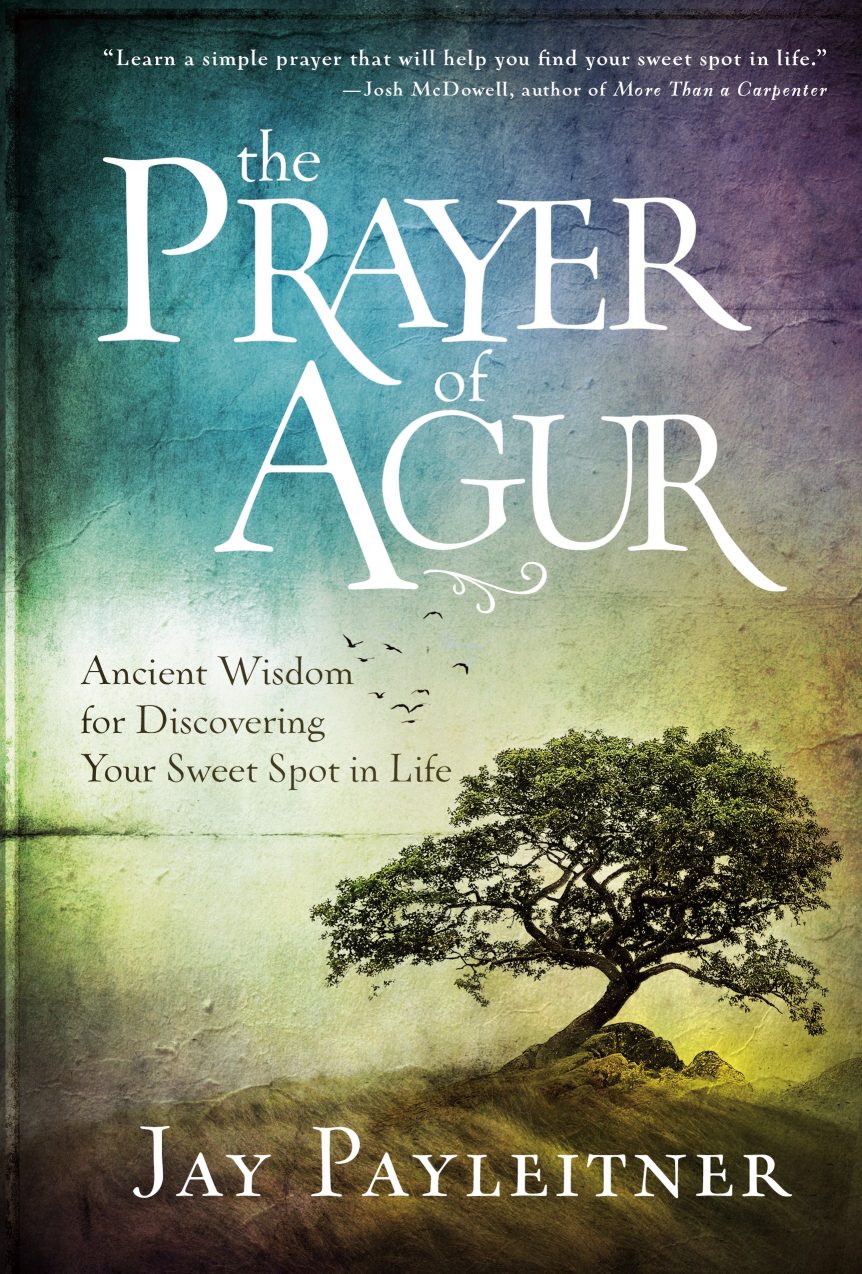 Guest Post by Jay Payleitner
Guest Post by Jay Payleitner
Might you ever question whether or not your modest life can make an impact? You’re not alone.
Allow me to introduce a man I am quite confident will be a new friend, colleague, and favorite prophet. In your study of the Bible, you’ve read the chapter he authored, but probably didn’t give the man himself much thought. His name is Agur. He’s smart, funny, and quite perceptive. He loves God. He’s streetwise in a good way. And he’s not afraid to speak his mind.
Meet Author Agur
Somehow, Agur’s writings made their way into the book of Proverbs. You have to give him credit for that. Three millennia ago there were quite a few word-slingers filling papyrus scrolls with inspired ruminations. Being included in the Old Testament alongside kings, prophets, and other spiritual giants is quite a coup.
“The sayings of Agur son of Jakeh—an inspired utterance. This man’s utterance to Ithiel: ‘I am weary, God, but I can prevail.’” Proverbs 30:1
Bible scholars agree that Solomon personally wrote or compiled chapters 1 through 29 of Proverbs. But how and why the last two chapters were tacked on is a bit of a mystery. No one disputes their relevance or authenticity, but very little is known about the authors.
The Other Author
We do know that Lemuel, author of chapter 31, was a king who received wise teaching from his mother. King Lemuel’s celebrated description in verses 10–31 of a “wife of noble character” has helped keep that last chapter of Proverbs in the limelight. The “Proverbs 31 woman” is a popular theme at women’s events.
Even less is known about Agur, author of chapter 30. As indicated in the opening words of the chapter, he was the son of Jakeh, another obscure reference, and he may have been from northern Arabia. That’s all the history we have. I suspect most readers of the Bible have never spent more than a moment considering his name, his reputation, or his single puzzling appearance in Scripture. Actually, that’s not unusual. There are quite a few historical characters who show up for a single scene or have only the briefest mention in the Bible but still leave a memorable impression. To prove the point, let’s take a quick look at three of them.
Other Memorable Minors
Senior-Saint Simeon
There’s Simeon, the aging prophet who met Mary and Joseph at the temple in Jerusalem when they presented Jesus soon after the fortieth day following His birth. The Holy Spirit had promised Simeon he would not die before seeing the Messiah. Taking the infant in his arms, the old man prophesied that Jesus would be a light to the world, causing the fall and rise of many people.
“Then Simeon blessed them and said to Mary, his mother: ‘This child is destined to cause the falling and rising of many in Israel . . . so that the thoughts of many hearts will be revealed . . .’” Luke 2:34-35
Simeon’s memorable story takes up a mere eleven verses in Luke 2.
Faith-Mama Jochebed
The name Jochebed is mentioned only twice—both times in long genealogies. But we could make the case that her actions launched biblical history. The mother of three heroes of the faith—Moses, Aaron, and Miriam—Jochebed had the foresight and courage to send three-month-old Moses floating down the Nile in a papyrus basket to rescue him from Egyptian death squads (see Exodus 1–2). We may not remember her name, but she should be revered as a beacon of hope for anyone living under oppression and for mothers who love their children enough to let them go.
Cross-Talk Thief
A third unforgettable biblical character mentioned ever so briefly is the repentant thief on the cross. On that history-changing Friday at Golgotha, one criminal hurled abusive taunts at Jesus, but the other recognized the divinity of Christ and confessed his own brokenness. We don’t know his name, but that thief’s insight at the triple crucifixion brings hope to those who come to Christ late in life, even in their final moments. In addition, Jesus’s promise to the thief, “Truly I tell you, today you will be with me in paradise” (Luke 23:43), suggests there is no lag time between our time on earth and our entrance into heaven. That’s good to know.
It’s also good to know that modest lives like yours and mine can still make an impact. Can you identify with a guy who was moved to tears when he held a new baby, a mother who saw a great leader when she looked at her infant son, or someone whose eyes were opened upon meeting Jesus for the first time? Like Agur, these were real people. Simeon, Jochebed, and the thief on the cross were simply doing life.
All the Bible for All of Time
On the other hand, the larger-than-life characters in the Bible—like Noah, Moses, Elijah, Abraham, David, Paul—can be a bit difficult to relate to. After all, God spoke to them on multiple occasions, and the Bible chronicles significant portions of their lives. That’s why, when I first came across Proverbs 30, I knew I had found an ally in Agur, a fellow humble traveler on this road of life.
I appreciate that Agur’s sayings—all thirty-three verses of Proverbs 30—made the cut. Since the chapter is included, then clearly the Bible would be incomplete without it! Which means we have a responsibility to spend time reflecting on how Agur’s words apply to our lives.
What’s more, his voice, his message, and his surprising prayer just might be exactly the plainspoken tonic we need to find peace in today’s world of universal discontentment and propensity for extremes.
From Mesu:
I love Jay’s last line: “…might be exactly the plainspoken tonic we need to find peace in today’s world of universal discontentment and propensity for extremes.”
Thank you so much, Jay, for your timely teaching on Agur, a character in Scripture I’d never considered until I read your piece! This article was adapted from pp. 5-8 of his new release, The Prayer of Agur, available wherever books are sold. Click here to find out more about Jay’s book.
 A Little About Jay:
A Little About Jay:
Jay Payleitner is the author of more than 25 books, including The Prayer of Agur, 52 Things Kids Need from a Dad, The Jesus Dare, and What If God Wrote Your Bucket List? He is also one of the top freelance radio producers in the United States and has worked on Josh McDowell Radio, Today’s Father, Jesus Freaks Radio for the Voice of the Martyrs, Project Angel Tree with Chuck Colson, and many others. He and his wife, Rita, live near Chicago, where they have raised five great kids and loved on ten foster babies. For more information, visit www.jaypayleitner.com.




Comments 7
Thanks so much Mesu and Jay for sharing the nugget found in the insignificant (to many), most Christians would tell you emphatically that Solomon wrote Proverbs and yet his was not the only voice Holy Spirit used to communicate a complete book. My heart resonated with your ‘discovery’ because that is exactly the things that hold my attention and curiosity about our Great God. He is so intriguing and perfect and He uses so much imperfection to accomplish His plans.
Author
Hi Danae!
I feel the same way about these types of discoveries! They make me want to dig into God’s Word even deeper to find more treasure. Thanks for your comment!
Mesu! Thanks for sharing this post. You have a new fan! And I suspect quite a few of your followers will be opening up their own Bibles to Proverbs 30:7-9 and reading Agur’s little-known prayer with fresh eyes. Which means lots of believers will suddenly find themselves living in God’s sweet spot! Best to you. Be well!
Author
Thanks so much for visiting, Jay! So enjoyed this post and learning more about Agur’s little-known prayer. Be blessed in your writing, brother!
This is intriguing, so I looked up Prov. 30:1 in multiple translations: NKJV, CSB, NASB, KJV, and ESV. The first 4 translations end with, “to Ithiel and Ucal” and say nothing about being weary. The ESV says, “The man declares, I am weary, O God; I am weary, O God, and worn out.” Why/how does the NIV translate it, “…I am weary, God, but I can prevail”? Thanks so much.
Author
Hi Louise!
I LOVE that you studied the Word and are asking questions. You go, girl! I’ll see if I can get Jay to answer because he’s done WAY more research on this than I have and can offer you a better answer.
Here’s my 2 cents: I often use blueletterbible.org to see various translations and study helps. Here’s the link for Prov. 1:1 – https://www.blueletterbible.org/kjv/pro/30/1/t_bibles_658001
If you click on the (fn) in the NASB (Prov. 1:1), you’ll see “oracle” could also be translated as “burden,” which is perhaps why the NIV & ESV used a word like “weary” to translate the other Hebrew words of unknown origin.
If you also read Prov. 1:2 in various translations, you’ll notice Agur is fairly “down” on himself and even describes himself as “stupid” or “brutish” in some translations.
No matter which version we choose to read, I felt like this guy’s writing began as pretty relatable to many of us today and then progressed to some valuable wisdom. In that, it was encouraging in any translation!
I hope that helps! And again, thanks for your question! I’ll try to contact Jay to see if he’ll add his more learned explanation. 😉
Louise (and Mesu). Great observation and a worthy question. It seems like sometimes discrepancies in translations come out of the blue, but there’s almost always a reasonable explanation and I believe God honors the pursuit of “getting it right.”
I actually have friends who worked on a couple different translations and it’s incredible how they dig into the old Masoretic text and other ancient resources. Often making new discoveries.
My favorite personal Bible — the one with years of underlines and margin notes — is my old 1978 NIV. It doesn’t mention that Agur was “weary” in the text, but does in the footnote! For the 2011 NIV update, the translation team chose to meld that footnote into the text. For reference, the 1611 KJV and 1982 NKJV also does not include the idea of Agur being weary. But the 1996 NLT and the 2001 ESV does.
All that to say, that sometime after 1982 most translators started to include the idea of “I am weary, God, but I can prevail” in Proverbs 30:1. I don’t know specifically what was uncovered or reinterpreted, but it seems to be a consensus.
Something you might find amusing. Zondervan, Crossway, and Tyndale are the copyright holders for the NIV, ESV, and NLT respectively. Since they are “businesses,” they see themselves in “competition” with each other for readership. I think that’s healthy and actually leads to more accuracy and readability. Even with their loyalty to their employers, the translation teams interact and often sort through the same research, recent findings, archeological discoveries, etc.
Finally, in addition to writing books and speaking, I also have the privilege of writing scripts for a radio broadcast sponsored by Museum of the Bible. I’m glad to say they are also extraordinarily careful about getting the facts and details right.